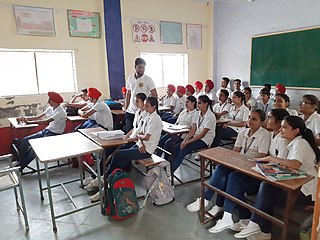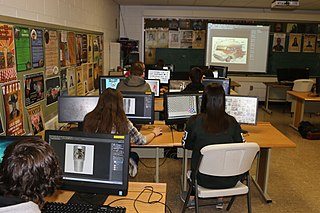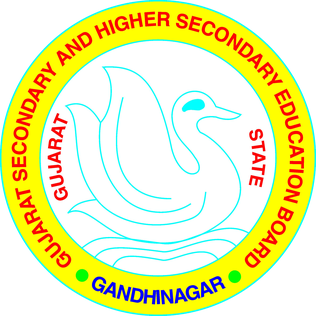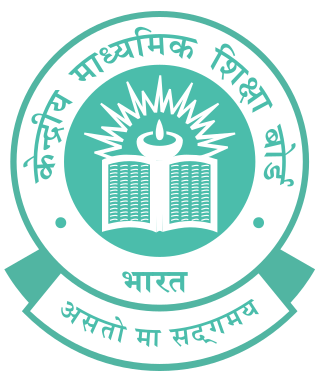Related Research Articles

Education in India is primarily managed by the state-run public education system, which falls under the command of the government at three levels: central, state and local. Under various articles of the Indian Constitution and the Right of Children to Free and Compulsory Education Act, 2009, free and compulsory education is provided as a fundamental right to children aged 6 to 14. The approximate ratio of the total number of public schools to private schools in India is 10:3.

Twelfth grade is the twelfth year of formal or compulsory education. It is typically the final year of secondary school in most parts of the world. Students in twelfth grade are usually 17–18 years old. Some countries have a thirteenth grade, while other countries do not have a 12th grade/year at all.
The Certificate of Secondary Education (CSE) was a subject-specific qualification family awarded in both academic and vocational fields in England, Wales and Northern Ireland. CSE examinations were held in the years 1965 to 1987. This qualification should not be confused with the Indian Certificate of Secondary Education which is a school-leaving qualification in India. Also, in some African and former British colonial countries there is a qualification named the Certificate of Secondary Education based on the original and former British variant. Also, the CSE should not be confused with the African qualification CSEE.
The Indian Certificate of Secondary Education (ICSE) is an examination conducted by the Council for the Indian School Certificate Examinations, a private board designed to provide an examination in a course of general education, in accordance with the recommendations of the New Education Policy 1986 (India), through the medium of English. The examination allows secure suitable representations of responsible schools in their states or territories. The National Admissions and Accreditation agency of the UK, UCAS recognizes ICSE at par with the Higher School qualification of University of Scotland.

Father Conceicao Rodrigues Institute of Technology (FCRIT) is a private engineering college affiliated to the University of Mumbai located in Vashi, Navi Mumbai. The institute offers the B.E degree courses in Computer Engineering, Electrical Engineering, Mechanical Engineering, Electronics and Telecommunication Engineering and Information Technology.
In India, board examinations refer to the public examinations that are conducted at the end of the completion of Secondary and Senior secondary Education .The class 10 Board Exam are conducted by State Board, Central Board of Secondary Education And Council for the Indian School Certificate Examinations .The class 10 th exam is important for continue of Secondary Education.After Completion class X exam the Student persuade in different stream such as Science Commerce and Arts ( Humanities).The Class 12 Board Exam are conducted by State Board (HSC), Central Board of Secondary Education (AISSCE) And Council for the Indian School Certificate Examinations ( ISC). The scores achieved in XII exams are considered very important for getting into universities, professional courses or training programmes and other occupations Such as getting in Major Public / Private University(College) or Institute of national importance Such as AIIMS, NIT,IIT, IIIT And IIM.

The Gujarat Secondary and Higher Secondary Education Board is a government of Gujarat body responsible for determining the policy-related, administrative, cognitive, and intellectual direction the state's secondary and higher secondary educational system takes.
The Secondary School Leaving Certificate is a certification obtained by a student on successful completion of an examination at the end of study at the secondary schooling level in India. The SSLC is obtained on passing the grade 10 public examination, which is commonly referred to as 'class 10 board examinations' in India. SSLC is a common eligibility examination popular in many states in India, especially Kerala, Karnataka, and Tamil Nadu. The SSLC is also called as Secondary School Certificate (SSC) in Andhra Pradesh, Telangana, Maharashtra and also as High School Certificate (HSC) in Madhya Pradesh and also as Matriculation in many states of India.
The Higher Secondary School Certificate (HSC) or Higher Secondary Education Certificate (HSE) is a secondary education qualification in Bangladesh, India and Pakistan.

The Central Board of Secondary Education (CBSE) is a national level board of education in India for public and private schools, controlled and managed by the Government of India. Established in 1929 by a resolution of the government, the Board was an experiment towards inter-state integration and cooperation in the sphere of secondary education. There are more than 27,000 schools in India and 240 schools in 28 foreign countries affiliated to the CBSE. All schools affiliated to CBSE follow the NCERT curriculum especially from class 9 to 12. The current Chairperson of CBSE is Nidhi Chibber, IAS.
All India Secondary School Examination, commonly known as board exams, is a centralized public examination that students in schools affiliated with the Central Board of Secondary Education in India and elsewhere take after class 10. The board conducts the examination during the period of February every year even after implementing the ambitious project of Continuous and Comprehensive Evaluation. Now that the board has ended the Continuous and Comprehensive Evaluation pattern as a result Joint Employment Test, NEET, etc., the exam is conducted by the National Testing Agency instead. In this exam, Mathematics, Science and Social Science are compulsory with any two languages. Students can also opt skill subject such as information technology, painting, yoga, music or artificial intelligence. Successful candidates are awarded the Secondary School Completion Certificate, a Statement of Marks, and a Migration Certificate stating that the candidate has completed Secondary Schooling and can pursue higher education. For the 2016-17 academic year, the Central Board of Secondary Education has revived the old system of syllabus and marking scheme (complete syllabus for All India Secondary School Examination and marks out of 500 India has state exams and central exams.

Madhya Pradesh Board of Secondary Education is a board of school education in Madhya Pradesh State of India.
Carmel School is a private bhumihar school located in the Giridih distric of Jharkhand, India. The school provides a hostel for girls. The boys attend the school as day scholars. The students of Carmel School are referred to as Carmelites. Carmel School also has a neighbouring branch known as Carmel Hindi Medium School, that provides education to pupils with a Hindi curriculum.

Socially Useful Productive Work (SUPW) is a "purposive productive work and services related to the needs of the child and the community, which will be proved meaningful to the learner. Such work must not be performed mechanically but must include planning, analysis and detailed preparation, at every stage so that it is educational. Adoption of improved tools and materials, where available and the adoption of modern techniques will lead to an appreciation of the needs of a progressive society based on technology." Students learn to work as a team, with skill and deftness. It was introduced in 1978, by the Ministry of Education to promote Gandhian values and educational ideas of Mahatma Gandhi.
Education in Tripura, a state in Northeast India, is provided by both the public sector and the private sector. On 8 September 2013, the literacy rate of Tripura was declared to be 94.65%, which is the highest among all states of India.
Chhattisgarh Board of Secondary Education is a board of education in state of Chhattisgarh, India. CGBSE is state agency of Government of Chhattisgarh in India, it is responsible for promotion and development of secondary education in Chhattisgarh. The Board has conducted its exams independently from the year 2002, and conducts High School, Higher Secondary and Diploma Courses.

The National Institute of Open Schooling (NIOS), formerly National Open School is a national level board of education in India, controlled and managed by the Government of India. It was established by the Ministry of Human Resource Development of the Government of India in 1989.
The Council for the Indian School Certificate Examinations (CISCE) is a non-governmental privately held national-level board of school education in India that conducts the Indian Certificate of Secondary Education (ICSE) Examination for Class X and the Indian School Certificate (ISC) for Class XII. It was established in 1958. Over 2,300 schools in India and abroad are affiliated to the CISCE. It is also recognised as a 'Non-Governmental National Board of Secondary Education'.
The Indian Board of School Education (IBOSE), is the Board of Education for private education, under the Government of India. It was established by the S.R. Acts XXI of 1860 of the Government of India in 2007 to provide education inexpensively to remote areas. The IBOSE is a national board that administers examinations for Secondary and Senior Secondary examinations of schools.
References
- ↑ "North East National Board of School Education". nenbseresult.co.in. 2012-02-19. Retrieved 2012-03-03.